(VOVWORLD) - Top 10 world events of 2018 selected by VOV
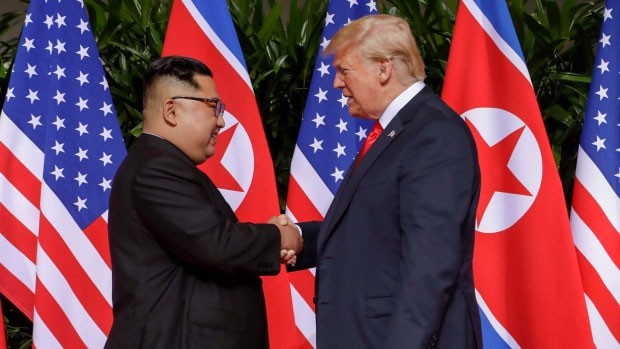 US President Donald Trump meets North Korean leader Kim Jong-un in Singapore on June 12, 2018. (Photo: Reuters) US President Donald Trump meets North Korean leader Kim Jong-un in Singapore on June 12, 2018. (Photo: Reuters) |
1. US-North Korea Summit and Inter-Korean Summit: historic opportunity for peace on Korean peninsula
Top leaders of the two Koreas met for the first time in 11 years in the truce village of Panmunjom on April 7, and again in May and September. On June 12 was the historic summit between the US and North Korea in Singapore. The summits raised hopes for complete denuclearization, peace, and stability on the Korean peninsula. Little progress has been made in implementing the promises exchanged, however.
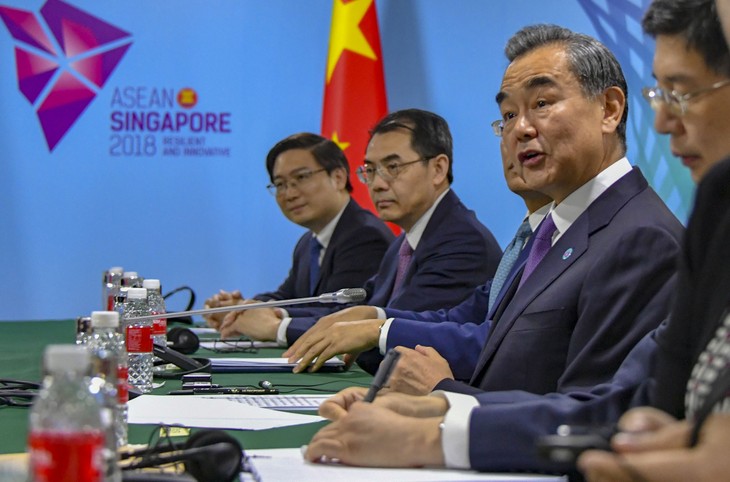 The ASEAN-China Foreign Ministers‘ Meeting in Singapore, August, 2018. (Photo: ASEAN website) The ASEAN-China Foreign Ministers‘ Meeting in Singapore, August, 2018. (Photo: ASEAN website) |
2. ASEAN and China agreed on “single text” for COC negotiations
ASEAN and China reached an agreement on a single text for negotiating the Code of Conduct in the East Sea. The agreement was widely considered an important step toward narrowing differences. ASEAN and China also agreed on the "key modalities" for future rounds of negotiations.
3. Trade protectionism on the rise; US-China trade war destabilizes global economy
Although the US withdrew from multilateral deals, anti-protectionism prevailed with the signing of the Comprehensive and Progressive Agreement for Trans-Pacific Partnership (CPTPP) and the near completion of the Japan-EU free trade agreement and the Regional Comprehensive Economic Partnership agreement (RCEP). CPTPP, which began to take effect on December 30, will create a free trade bloc of 11 countries, including Vietnam, with a total GDP of 10 trillion USD, 13% of the global total. The deal bolstered trust in free trade in the face of rising protectionism.
A trade war between the US and China began in July, after the US imposed tariffs on Chinese goods worth 34 billion USD. China immediately retaliated with similar tariff levels levied on US products. Although both sides declared a 90-day halt on new tariffs after a meeting between President Xi Jinping and President Donald Trump on the sidelines of the G20 meeting, the trade row between the US and China has already destabilized the global economy. In October, the International Monetary Fund (IMF) lowered its projected global economic growth rate to 3.7% for both 2018 and 2019.
 "Yellow vest” protestors in Paris on December 16, 2018. (Photo: Xinhua/VNA) "Yellow vest” protestors in Paris on December 16, 2018. (Photo: Xinhua/VNA) |
4. Riots in Paris, a warning to Europe
The “yellow vest” movement, which began as protests against fuel tax hikes, worsened into violent riots. The tens of thousands of protesters included opportunists, who vandalized symbols of France, forcing the police to use tear gas. French President Emmanuel Macron, in a televised address, on the night of December 10, admitted responsibility and reassured protesters with a promise to roll back the tax. The “yellow vest” movement exposed deep social divisions in France and raised alarm in the rest of Europe.
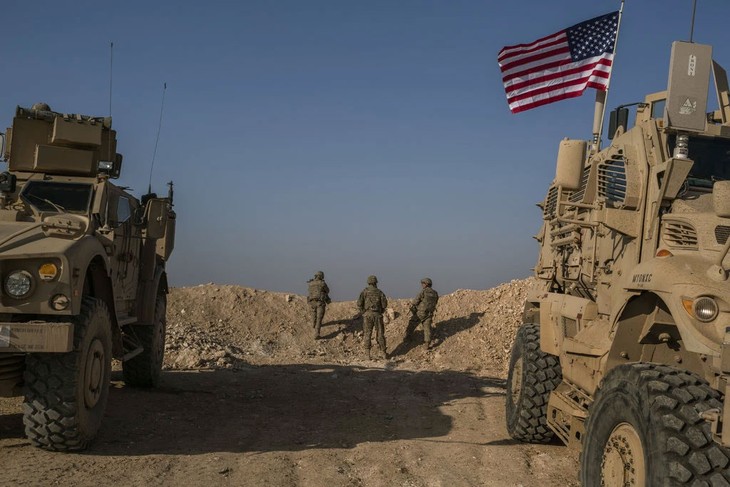 The US is expected to pull out troops from Syria. (Photo: Reuters) The US is expected to pull out troops from Syria. (Photo: Reuters) |
5. US announced troop withdrawal from Syria
President Donald Trump ordered the withdrawal of US troops from Syria, declaring victory over ISIS. The decision drew a mixed reaction. Tobias Ellwood, an official at the UK Ministry of Defense, strongly disputed President Trump’s statement that ISIS has been defeated in Syria. US Defense Secretary James Mattis filed his resignation.
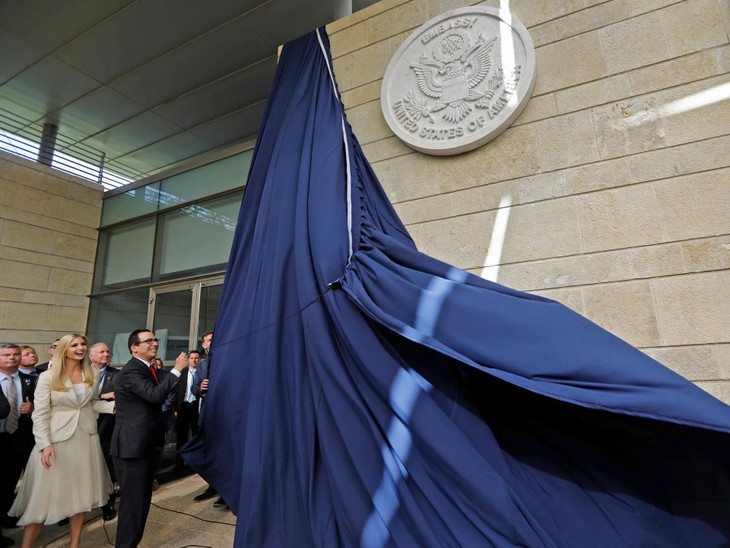 The US opens its embassy in Jerusalem in May, 2018. (Photo: Getty) The US opens its embassy in Jerusalem in May, 2018. (Photo: Getty) |
6. Gulf diplomatic crisis, US embassy moved to Jerusalem
Qatar’s diplomatic spat with Saudi Arabia, UAE, Bahrain, and Egypt continued unabated as those countries maintained their boycott against defiant Qatar. The two sides imposed economic sanctions on each other. In the last days of 2018, Qatar announced it will withdraw from the Organization of Petroleum Exporting Countries (OPEC) in January.
In May, the US moved its embassy from Tel Aviv to Jerusalem, one of the most controversial foreign policy moves of President Donald Trump in 2018. The move ignited waves of protests and bloodshed in the Gaza Strip.
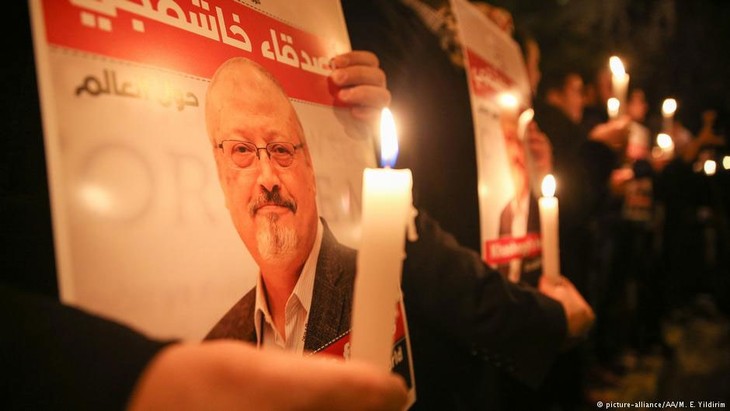 People raise Jamal Khashoggi's portraits in front of Saudi Arabia’s embassy in Istanbul, Turkey (Photo: DW) People raise Jamal Khashoggi's portraits in front of Saudi Arabia’s embassy in Istanbul, Turkey (Photo: DW) |
7. Saudi Arabian journalist murdered
Saudi Arabian journalist Jamal Khashoggi went missing after entering Saudi Arabia’s embassy in Istanbul, Turkey, on October 2, seeking marriage documents. 18 days later, the Saudis said Khashoggi was killed during an altercation there. Under intense international pressure, the Saudi Prosecutor’s Office said 11 Saudis had been charged and five of them will face the death penalty for the crime. The UN chief called for an international probe into the case, which has damaged Saudi Arabia’s image.
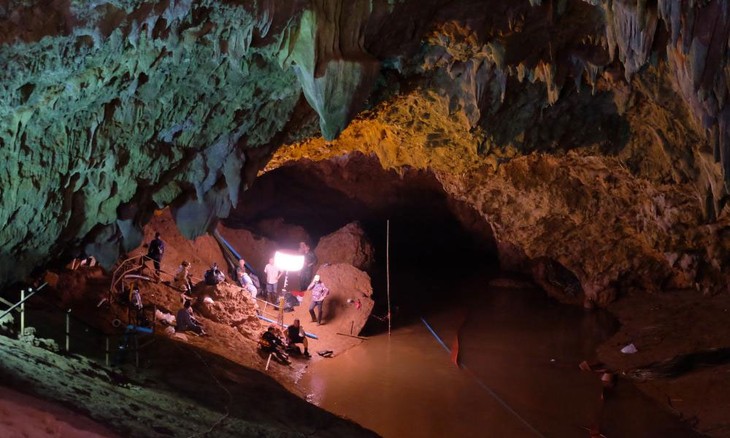 12 Thai boys and their football coach are rescued in July, 2018, after being trapped in a cave for 18 days. (Photo: The Guardian) 12 Thai boys and their football coach are rescued in July, 2018, after being trapped in a cave for 18 days. (Photo: The Guardian) |
8. Thai boys’ football team rescued from cave
The most complicated rescue operation in Thailand’s history ended successfully when all 12 boys and their soccer coach, who had become trapped deep within Tham Luang cave for 18 days, were brought out safely on July 10. 100 divers, Thai and foreign SEAL team divers and cave experts were involved. One diver died during the rescue.
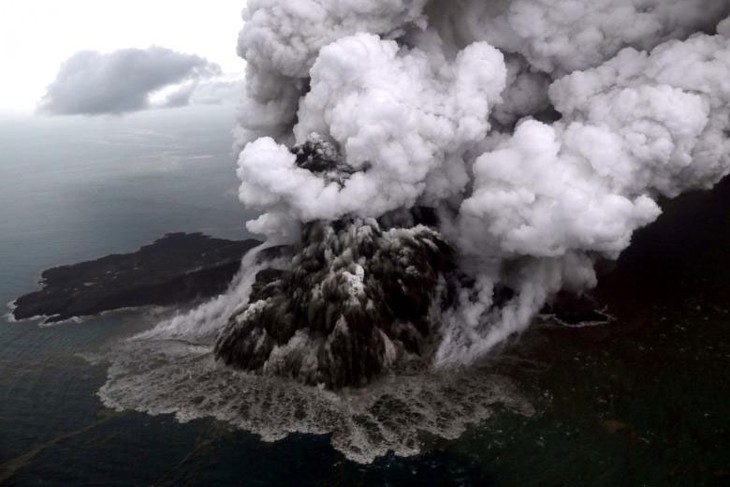 Anak Krakatau volcano erupts, triggering a tsunami in Indonesia on the night of December 21, 2018, killing 400 people. (Photo: Reuters) Anak Krakatau volcano erupts, triggering a tsunami in Indonesia on the night of December 21, 2018, killing 400 people. (Photo: Reuters) |
9. Many disasters occurred
An earthquake in Japan, floods in China, forest fires in the US and Greece, tsunamis and a plane crash in Indonesia, and a dam collapse in Laos killed thousands of people. The UN Climate Change Conference (COP 24), which took place in Poland from December 2 to 14, elicited concrete but non-binding commitments to fight climate change.
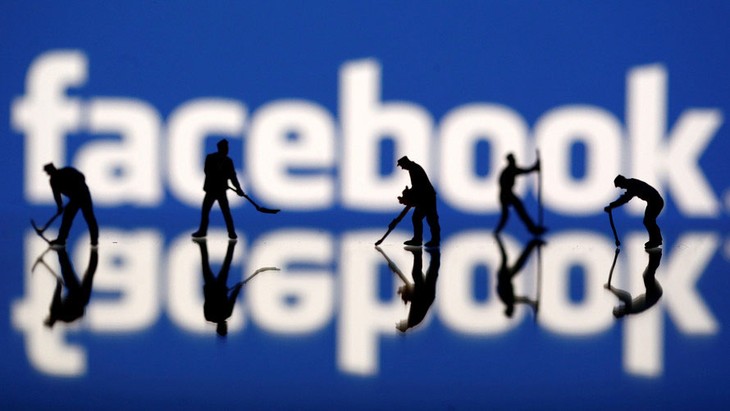 (Photo: Reuters) (Photo: Reuters) |
10. Facebook suffered data privacy crisis
2018 was a bad year for Facebook, the world’s biggest social network of 2 billion users. Facebook was accused of providing access to users’ data that was used to manipulate election results. The data leak scandals made Facebook’s stock price tumbling and forced six high-ranking officers to resign. The founder of Facebook was forced to testify before the US Congress.